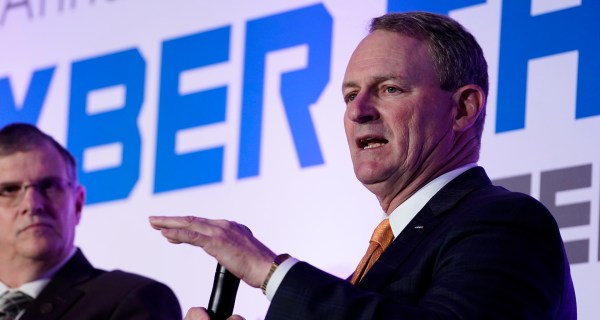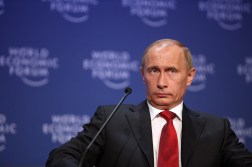Russian Embassy spokesperson confronts FBI, DHS officials in public event
A Russian Embassy spokesperson challenged two senior U.S. officials Wednesday during a public event in Washington, D.C., claiming the Trump administration refuses to collaborate with Russia to fight cybercrime.
The exchange happened at an event hosted by the Center for Strategic and International Studies (CSIS) focused on a new report published Wednesday by the think tank and cybersecurity company McAfee. The report speaks to the economic impact of cybercrime.
Along with other countries, Russia was specifically named multiple times in both the report and panel discussion as a “state sanctuary” of cybercrime due to the “close relationship between the Russian state and Russian organized crime.”
That accusation didn’t sit right with one Russian government employee in the crowd.
“Once again without any proof, Russia was called a bad actor in cyberspace,” said Petr Svirin, the Russian Embassy’s first secretary during a question and answer session. “If you are so concerned, why the government of the United States declined all the suggestions from the Russian side to start the dialogue on cyber issues?”
Svirin received no response from the the two U.S. officials on the panel: Howard Marshall, the FBI cyber division’s deputy assistant director, and John Felker, director of the National Cybersecurity and Communications Integration Center at the Department of Homeland Security.
Jim Lewis, a senior vice president at CSIS, responded by saying that it’s unlikely that a dialogue would be fruitful amid current tensions.
“Right now with all the turmoil in the bilateral relationship it’s hard to see how there could be a useful exchange,” Lewis said.
In his response, Lewis also praised the U.S.’s recent indictments of 13 Russians and three Russian entities for allegedly meddling in the 2016 presidential election through online activities.
“I’ve got to say I liked the indictments. I thought they were very good, solid indictments,” Lewis said. “That’s going to be one of the obstacles that we’ll need to get out of the way.”
In an email to CyberScoop, Lewis said he believes the Russian embassy is likely coordinating similar confrontations at other public events around D.C.
“The Russians have started a counter offensive where they send embassy people to events to stand up and make the same points: no proof, we are ready to cooperate (on our terms),” Lewis said.
In the past, Svirin has been quoted by news outlets stating that there were no “Russian soldiers in the Crimea.” This is a claim that’s been universally disputed by the international community, including the U.S. government.
White House National Security Adviser H.R. McMaster scoffed at the prospect of dialogue with Russia on cyber issues when asked about it by a Russian delegate at the Munich Security Conference on Saturday, the Associated Press reported.
“I’m surprised there are any Russian cyber experts available, based on how active most of them have been in undermining our democracies in the West,” McMaster said at the conference, “We would love to have a cyber dialogue when Russia is sincere about curtailing its sophisticated form of espionage.”
McMaster’s comments followed a series of tweets posted by Trump last year, stating plainly that he was considering forming “an impenetrable Cyber Security unit” with Russian President Vladimir Putin. Trump later backpedalled on the idea after Republican and Democratic lawmakers, in addition to private sector experts, overwhelming voiced their disapproval.
The FBI did not respond to a request for comment.
You can view a clip of Svirin’s question at the CSIS discussion below:
Chris Bing contributed to this story




